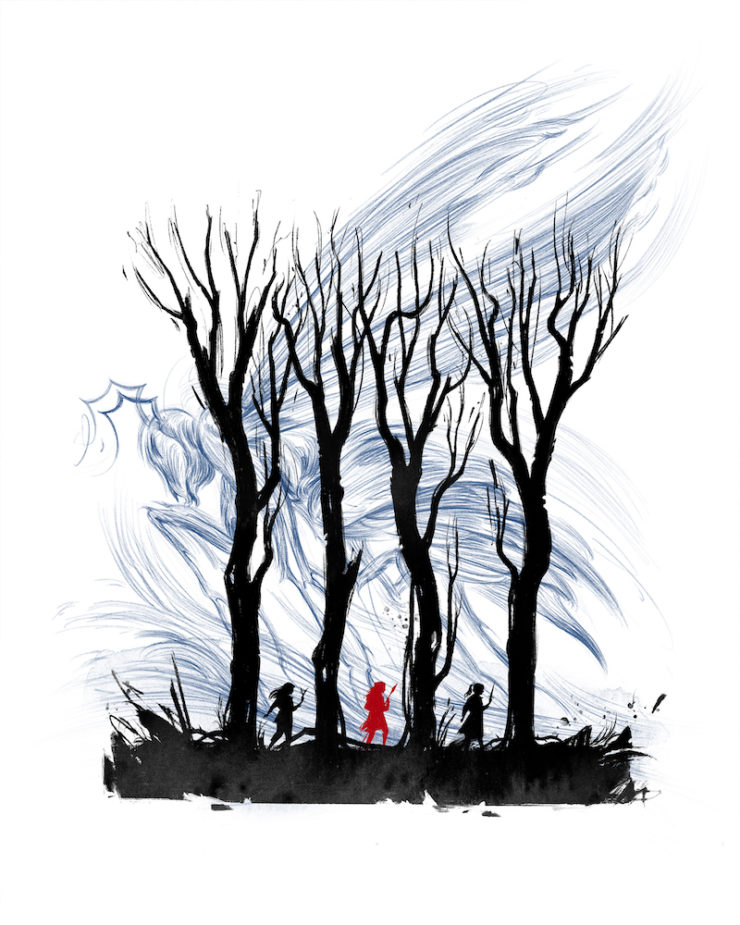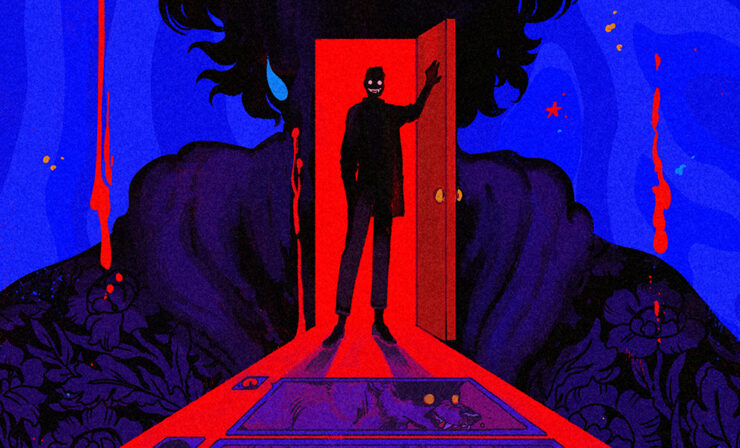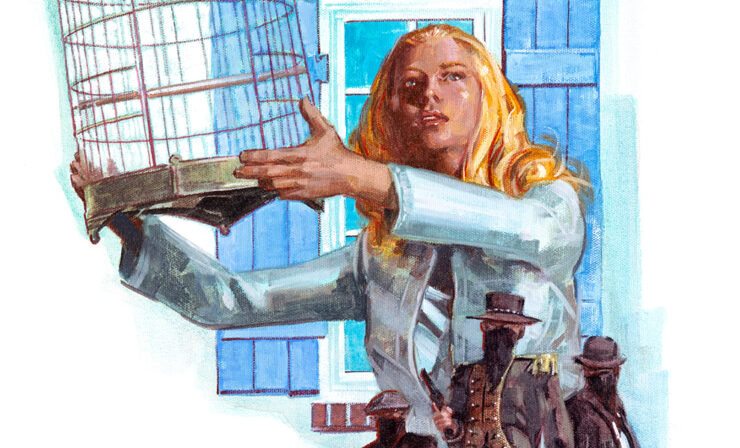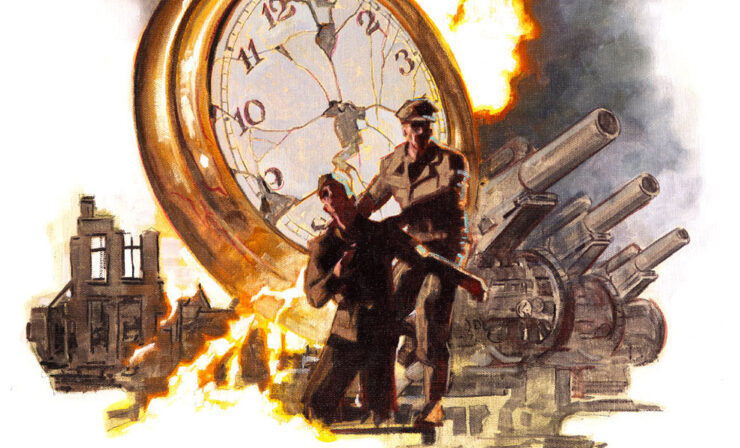In the course of every great adventure there are multiple side-quests. All too often these go unreported—perhaps because the adventurers in question fail to return to the main narrative due to death or other distractions, and sometimes because the chronicler of the events decides to edit out that part of that particular history for reasons of their own (historians are never infallible)—but occasionally we get another window into our heroes’ world.
In Juice Like Wounds we once again get to meet Lundy, and some of her companions. Lundy’s main adventure is detailed in In an Absent Dream (which is nominated for a Hugo Award, this year!) and you should definitely read that. Before or after this tale is up to you.
Remember: Side quests are fun.
For the reader, at least…
This is the story of three girls who went into the woods together, and the two girls who came out the other side. I tell you this so that you will know, even from the beginning, that to become overly attached is only to do yourself a profound and primeval harm. Stories are weapons, you see. All stories. Some are swords and some are cudgels, but all of them can hurt you, if you allow it. If you give them the space they need to twist and wriggle in your hands, becoming something other than friendly, becoming something other than tame. All stories are weapons, and children’s stories are doubly so, for children have not yet learned how to be careful.
Where there is a wood filled with monsters, there will be need for heroes; where there is need for heroes, there will be children who think their hands are perfectly shaped to hold a sword, that their throats are protected by the armor of their virtue, that the immortality every babe is born believing is theirs extends even to the dark places where serpents dwell. The places where shadows whisper lies to any ear willing to listen. And where there are children who know, without a doubt, that the monsters exist, and that there must be a quest in the fullness of time.
Time is never as full as it seems when clutching the vessel, when measuring the drinking of it with our eyes. Time always runs out before anyone is ready, before every cup is full.
Buy the Book
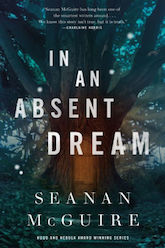

In An Absent Dream
Three girls who would be heroes; three girls with stars in their eyes and stories in their hearts, fatted like calves on tales of heroism, believing themselves invulnerable, immortal, imbued with the purity and purpose of all the heroes who had come before them; three girls too young to ask the essential question of what, precisely, had become of all those glorious heroes, if they were gone and the wood still stood, its deepest shadows still filled to bursting with monsters. When children see a story left unfinished, they tend not to ask what happened to leave it in that state: They rush, instead, to finish it.
But we are getting ahead of ourselves. Three girls: Let us take a moment to meet them.
The youngest of them was also the wildest, and had lived in the place they called the Market for as long as she could remember. For her, the Market was mother and father both, was comfort at the end of a hard day and laughter at the end of a soft one. She did not know how old she was, although the adults who moved around her said that she was no more than seven, all long gangling limbs and wild, uncontrolled motion. Her skin was pale beneath an ever-present shell of grime, and hair was long, brown, and often uncombed, making a home for twigs, leaves, and small brown feathers banded with black. The feathers grew from her scalp, although it could be difficult to tell just by looking at them, and they matched her owl-orange eyes, making her eventual nature clear for anyone to see. She had never been given a name by anyone with the authority to grant her one, and so had taken a name for herself, stealing it from the white-faced rabbit that watched her from the sky every night when the sun went down. “Moon,” she called herself, and “Moon,” the Market called her, and Moon she was.
The eldest of them was also the bravest, and had come from the farthest away, tumbling through a series of doors, from world to world, looking for a place where she could be kept and comfortable. She would not speak of the world where her story started, nor who might have been waiting there for her return; as far as she was concerned, those people had passed into another tale as soon as she had opened a door that didn’t exist in the side of a stone mountain, slipping through it without hesitation. Her skin was only a few shades paler than Moon’s hair, and her own hair was black as molasses, which made the long silver-white feathers that tangled there all the more striking. More feathers lay flat and quiet against her shoulder blades, concealed by her clothing and disregarded, for she was young enough not to be concerned about taking to the skies. Or perhaps that was simply her swan’s nature showing through even while she was still more than half a girl. Her name had been left behind, on the other side of one of her many doors, but the people of the Market called her “Mockery” with no cruelty in their hearts. If she was a cruel word, she was their cruel word.
The last of them, and not the least of them, was also the most recently arrived, a girl who had, like Mockery, come stumbling through a door but who, unlike Mockery, would say precisely where she had come from, and that she intended to go back there when her time in the Market was done. Her door was still there, waiting for her to return, and she still knew her original name, had yet to trade it for any need or luxury or passing infatuation. She had hair the color of straw pressed flat into the mud, and eyes like river water, and she had no feathers of any sort, not tangled in her hair or growing from her skin, and so the wings that spread in her heart were as yet unknown, as they would have been in the land of her birth, where children never became birds, not even for the summer holidays. She called herself “Lundy,” and the Market allowed it, for it was a name that had never belonged to her alone, but had always been the property of her family as a whole, and so could not be begged or bartered or traded away. Her proper name she kept tucked safe and close to her heart, where no one could see or steal it.
They met each other in the Market, Mockery when she tumbled through her door and into Moon, and Lundy much the same. It was Moon who brought them together, Moon who felt rich in friends, so rich that she would have been a miser if she had kept them both to herself alone, Moon who feared, if only for a moment, that they would each care for the other better than they cared for her, leaving her behind in their joy at a new acquaintance. But she knew, after her time in the Market, that a fortune risked was better than a fortune hoarded, and so she brought them into each other’s company and stepped back, waiting to see what would occur.
As for Mockery and Lundy, they were unaware of how much it had cost Moon to bring them together. They circled one another, as anxious as two cats shaken from the same sack, and just as inclined to hissing and claws. They might never have been friends; it might have been only two girls who walked into the wood, not three, and then who knows how many would have come out the other side?
But Lundy, who was still new to the idea of having friends, was also young enough to be malleable in her thinking, and to believe that the universe was an essentially kind place. Unfair, yes, and often cruel, but kind all the same. So after they had circled for some minutes, she stopped, and held out her hand, and said in a bright, clear voice, “I’m Lundy. Moon says you’re her first friend, and I’m her second friend, and neither of us has lived here as long as she has, so I guess we could both use more friends. I have credit with Vincent who makes the pies, if you want lunch.”
Mockery looked at Lundy, and saw nothing of her name reflected in the other girl’s open, honest face. She was bargaining in good faith. She might not have realized yet that not everyone would be, that the Market’s rules about fair value and giving as good as you got were there for her protection, and not because someone had grown bored with a pen in their hand and settled to spinning structures that no one needed. She’d learn in time. Mockery had learned, and there had been people back in her first home place who would have sworn on a stack of holy books that she was incapable of learning.
Well, those people were shearing their own sheep and minding their own babies now, and she was wild and free and living in a world of sunlight and magic and friends. Friends like Moon, who had seen a new good thing come into her life—Lundy—and had thought immediately to share. Mockery had won. She could afford to be magnanimous.
“I like pies,” she said. “And I was fishing this morning, so I have some crawfish we can trade to the lemonade stand for drinks.”
Both girls turned toward Moon, united for the first time—if not the last—in needing something from her. They were not yet friends, yet each was contributing something to the meal. For Moon to eat without contribution would not be fair value.
Moon was the youngest of them, and as such, the Market set her the lowest prices possible. “I have some white stones I’ve been saving,” she said. “I could trade for cookies, or for sugar candy.”
Mockery and Lundy smiled at her, and in an instant, the beginnings of a friendship were formed.
Friendships are in many ways like rivers. They branch and fork, tributaries feeding into one another, and the river that is made when two come together is not the same as the one made when three combine. So between the three girls, there were four friendships, and each of them is relevant to the woods, why they went there, and why only one friendship came out the other side.
Moon and Lundy together were steady and slow, a kind river meant for fishing and lazy summer afternoons. They tempered each other well, and the balance of their company meant that each made the other safer from her own worst impulses.
Moon and Mockery, on the other hand, were a river filled with rapids and with sharp-jawed fish whose teeth could rip and tear. The edge of Mockery’s tongue met the boldness with which Moon attacked the world around her, and they formed something dangerous and wild.
Mockery and Lundy were an unpredictable combination, sometimes swift and sometimes slow, sometimes cruel and sometimes kind. They brought out the worst in one another, and thought nothing of it, for they dared each other to be braver and better than they were apart, and all in the name of impressing Moon, who clapped her hands and smiled for everything they did.
When the three of them came together, they were a flood in waiting, a massive rushing tide that washed away whatever stood in its way. Together, they believed that they were heroes, chosen by the Market to be its new protectors, providing fair value simply through their presence. Why, if they could find a problem that had haunted the Market for long enough to be accepted as part of the way things were, they could defeat it, and then they would have paid their debts in advance for a hundred years or more! Since none of them came from a world where they would expect to live longer than a hundred years, this would mean a lifetime of indolence and good things, and no more effort expended than a single grand adventure!
All children have such dreams, afternoons spent saving imaginary princesses from towers made of trees or piled stones, evenings spent fighting and vanquishing monsters too terrible to name. Children play at adventure; it’s a part of childhood. And in most places, that is all it is, for there are few enough dangers left in the world that are simple enough to be defeated with the swing of a sword.
Any two of them might have abandoned the idea of heroism as foolishness. But their triplicate friendship contained both the vicious danger of Mockery and Moon together, and the brutally concise rivalry of Lundy and Mockery. And so they spurred each other on, and refused to set the thought of grand adventure aside.
Lundy, as the newest arrival among them, had taken to spending time with the Archivist, who was the oldest person in the Market, and who knew everything there was to know about everything worth knowing. The Archivist collected books, and she allowed Lundy to read them as long as she treated them gently and discussed what she had read with the Archivist afterward. It was a small price to pay for the delight of access to new books, and if it felt a little bit like homework, well, the more Lundy learned about living in the Market, the more she came to see homework as a sort of fair value given to her teachers. They gave her lessons, and she gave them proof that those lessons had not been wasted.
Through the books, Lundy untangled the story of the Market one history and journal at a time, reading of harvests and homesteads, of failed attempts to circumvent the rules of fair value, and the costs the Market claimed from those who would abuse it. She learned, to her surprise, that there were people who found fair value to be unfair, who considered any system under which they could not somehow make themselves superior to the people around them to be out of balance and cruel. When first she encountered one of these accountings, she went to the Archivist, a sour taste in her mouth, half-convinced that she had done something wrong by interpreting the text so incorrectly.
But the Archivist only looked at the book Lundy was holding, and made a small, unhappy shape with her lips, and said, “Ask, then, if you feel the need. I will answer your questions without charge, for it’s all a part of discussing what you’ve read. You don’t need to fear debt from someone else’s misdeeds.”
Lundy took a deep breath. “Do people really leave the Market?”
“Some leave the Market so profoundly that they leave the entire world,” said the Archivist. “You must be more precise with your questions, even when they’re being answered freely, Lundy. Specificity is the grace of barter.”
Lundy’s thoughts were whirling like spring winds, dashing in all directions, impossible to corral or contain. She furrowed her brow, ducking her head as she tried to put them into order. Finally, she asked, “Do people really leave the Market because they can’t fathom the idea of giving fair value to others?”
“There are some people for whom the only fair value is their own dominance over everyone around them,” said the Archivist. “They can’t look at someone who is equal to themselves and see them clearly; they assume that for anyone else to be the same, they must be cheating, or that something must have been taken from the first and given to the second, for surely it can’t have been earned. For them, a level stretch of ground is an unfair advantage given to others who don’t deserve to be elevated to what they consider their rightful place. They believe themselves above the world, above the Market. They never understand what it can cost to care.”
“So they just . . . leave?”
“They are unwilling to pay the price of dealing fairly with their fellows, and so they go, but they came here for a reason, and have no other homes to return to, so they stay. Close, but not contained within the Market’s boundaries. In the wilds, they can cost no one anything, and thus incur no debts, and think themselves protected from the consequences of their actions. And for some, this is true. The ones who seek solitude for reasons other than selfishness or disdain for their fellows can thrive in the wilderness. The ones who have bleaker soil in their souls, though . . . they grow other crops.”
“Other crops?”
“They are the makers of monsters, and their workshops are their own hearts. Given time enough, they become terrible things, takers of children and stealers of dreams. But they never don the feathers they so feared, and they sometimes grow enough in strength to steal things that were never meant to belong to them, and so they feel themselves acquitted.” The sorrow on the Archivist’s face was painful to behold. “Good children should not sport with monsters. There are always costs.”
Lundy nodded, and clutched her book tight, and that night as she lay with Moon and Mockery in the hollow formed by an old tree’s roots, she whispered to them of monsters made from men, of thieves who had stolen pieces of the Market itself away. “If we take them back, it’s not theft,” she said. “It’s . . . it’s a setting-right. Setting-right doesn’t cost anything. Setting-right is the right thing to do. Setting-right is paying old debts, not making new ones.”
Moon and Mockery nodded. Whether she was right or not, she sounded right, and what she was saying matched what they already wanted to do; it was only natural that they would listen to her.
“But where do we find a monster?” asked Moon. “I’ve been here my whole life, and I’ve never seen one. Only different kinds of people. No monsters.”
“Some of the other books talked about places I’ve never seen like they were everyday things,” said Lundy. “Like they’re places we should be going to play or gather fruit or fish or something, only they aren’t part of the Market anymore. If we wanted to find a monster, I bet we could do it by going one of those places.”
“Then we should go to the one the books stopped mentioning the most recently,” said Mockery abruptly. The other two turned to look at her. She didn’t talk as much as Lundy, who liked to hear the sound of her own voice almost as much as she liked to hear music, or Moon, who always had questions when it was safe to ask them, and sometimes when it wasn’t. But because she didn’t talk as much, when she did speak, Moon and Lundy listened.
“Why?” asked Moon.
“Because wherever people could still go until not too long ago probably has the smallest monster in it,” said Mockery. “I want to be a hero. I want to fight a monster. But that doesn’t mean I want to be a fool, or to fill the belly of a monster. Not when we could be sensible, and be heroes, and come home on the other side of it, to all the good things we could ever ask the Market to provide.”
Lundy nodded gravely. “I’ll read more tomorrow,” she said, and indeed, when they woke the next morning, damp with dew and stiff from sleeping tangled in the old tree’s roots, she went racing back to the Archivist’s house, to spend the day reading as much and as quickly as she could. She read like there was suddenly a time limit on reading, like all the books were going to be snatched away at any instant, and the Archivist, who had seen generations of children wander into the Market’s wonders, watched them grow and mature and become part of the strange system of barter and benign greed on which it ran, watched her but did not intercede. Children had their moments of passion, their fixations and their joys. Let this one live in her world of stories and dreams. She’d outgrow them soon enough.
The Archivist did not make many mistakes. She’d had time enough to break the habit. But it meant that when she did make them, her first mistake would be the mistake itself, and her second would be failing to see it clearly. She believed in the illusion of her own omnipotence, and so her small failings were doubled.
So it was that when Lundy came to her that afternoon and said, “This book talks about a pomegranate grove. I’ve never seen pomegranates for sale in the Market. They must be very valuable, and fallen fruit belongs to no one. We could eat for a week on one bushel, and everyone would still receive fair value for the harvest. How do I get there?” the Archivist did not do what she should have done, which was to wrench the book from Lundy’s grasp, sit her down, and warn her of the dangers of dowsing for monsters. Instead, she folded her hands and said, gravely, “The pomegranate grove was lost before you came here, and we do not seek it any longer.”
There was much more she could have said, if she’d been asked, if Lundy had been willing to pay for her answers. She could have said that the pomegranate grove would be reclaimed in time, but that the cost to do so would be very high, for it was the home to a monster that had once been a girl named Zorah, who had fallen into the Market from Lundy’s own world, who had been sweet enough to attract a door, but filled with a heart of venom and cruelty that had left her unable to trade fairly with her fellows. When her cruelty had grown too much to contain and she had fled to the dark places, she had found herself clad not in feathers but in a hard striped shell of chitin and pain. Good children who made bad bargains became birds. Bad children who cheated and deceived became their destroyers.
She could have said so much more, and that knowledge would haunt her in the days to come.
“But where is it?” pressed Lundy.
“To the west,” said the Archivist. “Now please, find another book to fall in fascination with, and do not go alone to the pomegranate grove. You are dear to me, and it would not give our friendship fair value.”
“I promise,” said Lundy.
And indeed, she didn’t go alone, but finished her day’s reading, slowly, so as not to alert the Archivist, then went to the wood where her greatest treasures were kept concealed and belted the knife she had purchased for the scaling and gutting of fish to her waist, where it hung with all the reassuring weight of a weapon disguised as a tool and thus deemed somehow safe for children. Then she went looking for Mockery and Moon.
They were in the berry patch near the stream, Moon glutting herself on blackberries that she ate almost faster than she could pick them, Mockery harvesting with deliberation and care, picking only the ripest, visibly sweetest berries and placing them gingerly into her basket, so they would not bruise. A full basket of hand-harvested blackberries could be traded for dinner, or for a new blanket, as the winter was approaching and soon it would be cold. None of them had apprenticed to a profession, as yet; they lacked the resources or guidance to make goods that could be traded for a full season’s shelter.
One more reason to go hunting for monsters, one more reason to reclaim the pomegranate grove. That harvest would be enough to see them under strong roofs and protected by solid walls well before the snows came, and while the Market would never allow children to freeze, it also would not aid them if they didn’t show how much they wanted shelter. It was a strange system, and not always kind, but doing what it could to meet the needs of many without failing the few.
“We go west,” said Lundy, and Mockery set her carefully collected basket of berries down, so that she could clasp her hands beneath her chin and look through her lashes at Lundy, framing her in black strands like spider’s webs.
“What’s west?” asked Moon, and stuffed another handful of berries into her mouth, fingers stained purple with juice and sticky even to the eye.
“The pomegranate grove,” said Lundy. She kept her gaze on Mockery. If they were going to do this, Mockery would have to agree. Moon would go along with anything she wanted, but if Mockery laughed and asked if she thought they were really hunting for monsters, then they would pick berries, and fish in the stream, and build up their saleable goods against the coming winter.
“You have a knife,” said Mockery. “I have the spear I made for lake fishing last spring. Moon has her sling. If we can stop by the fruit traders so I can sell these berries, we can go now.”
They weren’t going alone: None of them were. Lundy wasn’t breaking her promise to the Archivist. So Lundy smiled and said, “Of course we can stop.”
They shouldn’t have stopped.
Barter was never particularly swift, and it became slower when either party showed even a hint of impatience, unless they were willing to accept any offer and stop the exchange at once. The fruit vendor behind the berry bales took her time sorting through the berries, finding three that had been squashed by the weight of the others, the girls waiting the whole time for her final verdict. Finally, she agreed to provide the secondhand blanket Mockery had been hoping for, as well as a basket of carrots and alliums that could be combined with the fish the girls netted for themselves to make a fine stew for dinner. All parties involved agreed that the trade was fair on both sides, and the girls left with their hard-earned gains as the sun was just beginning to sink in the corner of the sky.
They could have gone back then, could have started their stew and set out again by daylight, but they were children in the clutches of a quest. That it was a quest they had chosen for themselves made it weigh no less. It had them now, and they felt compelled to complete it. So when they reached a large rock at the edge of the current Market grounds, they paused to hide their day’s trading where it would not be accidentally found, using a stick to scratch a circle, a book, and a laughing mouth into the dirt beside it—Moon, Lundy, and Mockery. No one in the Market would knowingly steal from a child, and nothing they were leaving was likely to attract wild animals. Their possessions would be safe until their return.
They walked west, the three girls: Lundy with her knife, Mockery with her spear, and Moon with her sling. And when the trees loomed before them like the walls of heaven, they exchanged a look but not a word, ducked their heads, and stepped into the darkness.
The wood swallowed them without a sound, and all was silence, save for the distant screaming of the owls, the calling of the crickets, and the wind.
The three girls walked a goodly distance into the darkness and silence of the wood. They had been living as wild things for some time, and they moved with calm assurance through the trees, their feet avoiding roots and gopher holes unseen, their heads bowing just before they would have met with branches. They walked and walked, until without warning, the trees fell away, and they had entered an open grove.
Buy the Book
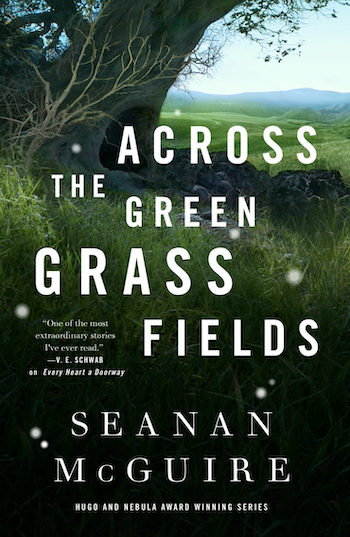

Across the Green Grass Fields
The trees here were less densely packed, their branches spreading wide and open as the fronds of ferns. They bristled with twigs like thorns, drooping low under the weight of red round fruit that were nowhere so inviting as apples, being covered in leathery skin.
The sky was more open here, moonlight pouring down through the open branches to paint the grass and the fruit already fallen there. It was an easy fortune, only waiting for someone to be clever enough to come along and claim it. Moon made a small sound of joy and dove for the nearest fruit, her hands outstretched.
The movement came from the other side of the grove, too fast to be avoided, and Mockery lunged after Moon, her body slamming the other girl to the ground before the charging creature could strike her. The two rolled onto their backs, staring. Lundy drew her knife and clutched it close, eyes bulging from her head.
The creature that dove for them out of the trees was a great wasp, easily as large as Lundy herself, with glossy diaphanous wings that beat and churned the air, holding the creature away from the ground. Its body was covered in a layer of metallic blue armor, bright and beautiful as sapphires, that darkened into purple as it moved along the great wasp’s abdomen, ending in a blue-black stinger the length of Lundy’s arm. The wasp twitched its antennae, eyes on Lundy.
“So the old bitch sends children to kill me, after what she did, after what she did to me?” demanded the wasp, and its words were the most terrible thing of all, for they were bright and clear and sweet, the voice of a girl of eleven or twelve, and not the voice of a monster at all.
“No one sent us,” said Lundy, and her own voice shook with fear. “We came on our own, because you’re not giving fair value! You’re not using all this fruit, and we need it!”
“You’re a child,” countered the wasp. “You shouldn’t be working to earn anything. Your needs should be met. Even fair bargains are unfair when enforced against someone who has no choice in the matter. Even kind cruelties are still cruel. No. This place is mine. Call it fair value for what she took from me, and go. I am the wasp queen, I am the monster she made of me, and I won’t negotiate with you.”
She cried out then, as a hard sphere struck the base of her right wing and sent it bending inward, nearly knocking her from the air, and when she spun around, she saw that Moon was sitting up, sling in her hand, having used it to throw a pomegranate with more force than her arms could ever have managed. The wasp queen shrieked then, anger and betrayal and some small measure of sorrow, and dove for Moon.
And we may leave them there, if you like. You know what happens; you know that three came and two left, and that the one who did not leave would never leave, not with her friends and not on her own. You know this story. You can go. You do not have to stay and see.
But while we have the luxury of leaving, they did not; they were trapped by the cage of their own choices, prisoned by the moment they had made. The wasp queen dove like a striking snake, and there was barely time for Mockery to shove away from the ground and brace her spear in the soil at her feet, tip pointed upward, before the blow landed.
The wasp queen screamed, hollow and shrill and agonized, as the spear punched through the chitin covering her torso. Mockery did not scream. Nor did she loosen her grasp on the spear, only sighed, small and sad and somehow resigned, and looked down at the stinger piercing her abdomen. The wasp queen screamed again, body pulsing as she drove more venom through herself and into the girl who held her impaled. Moon scrambled backward, unsure what else she could do.
And Lundy, knife in her hand, dashed forward and cut the wasp queen’s head clean from her body. It rolled some feet away and stopped in the loam, still beautiful, even now that it was dead.
The wasp queen’s form shook, collapsing as its wings stilled, and the weight of it drove Mockery to the ground, stinger still piercing her belly, just below her navel. There was no blood as yet; the seal it formed against her flesh was too tight and strong.
“Mockery!” Moon finally cried, and tried to roll the body away.
“No!” cried Lundy, but it was too late.
The stingers of bees are barbed, and will pull the bee to pieces when removed. The stingers of wasps are smooth, and this one slid out of Mockery’s body as easily as a needle slides out of leather. Blood followed, a great blackened gout of it, and Mockery, who had not made a sound since she was stung, began to shake and spasm, her eyes rolling up into her head. Lundy dropped to her knees and gathered Mockery in her arms, uncaring of the blood.
“Mockery? Mockery, wake up. Mockery, say something.”
Mockery wheezed and tried to move her lips, but no sound came out, only a trickle of blood as thick and slow as pomegranate molasses.
“Lundy, Mockery’s hurt!”
“I can see that,” Lundy snapped, and pulled her shirt off, wrapping it as tightly as she could around Mockery’s bleeding stomach. The fabric grew wet and dark, and the shaking and spasming continued, until finally the blood slowed and stopped, and Mockery stopped as well, and Lundy held a cooling object where once her friend had been.
Moon, who had been in the Market longer than any of them, rose and began gathering pomegranates from the ground, pausing only a moment before she added the wasp queen’s head to her haul. When Lundy looked at her with dull, disbelieving eyes, she said, “To barter for Mockery’s funeral. We have to pay to bury her, or they’ll leave her for the carrion birds.”
“She can’t go to the vultures,” said Lundy. “She always said she was going to be a swan.”
“You carry her, and I’ll carry the fruit,” said Moon.
Lundy nodded, rising, not sure what else to say. She lifted Mockery, who seemed lighter now, lesser now, as if something essential and heavy had gone.
Together, the two girls and the broken doll that had been their friend walked back into the wood, returning the way they had come. They did not speak. Their tongues were leaden in their mouths, all chatter stolen away with the girl who had loved it enough to take it for her name.
The Archivist was horrified if not as surprised as she wanted to be when two bloodied children carrying the body of a third staggered down the path toward her home, their hands red with juice like wounds, their eyes red with weeping. She went to them, and she did what she could to console them, and she held Lundy tightly as the child cried, grieving with all the force of one who had never realized hurt could come so very close to home.
Mockery was buried by the river that night, silver-white feathers still tangled in her hair.
Lundy was gone the next morning, slipping back through her door without a word said, and of the four rivers three girls had made between them, all that remained was the trickling stream that was Moon, alone.
Buy the Book


In An Absent Dream
“Juice Like Wounds” copyright © 2020 by Seanan McGuire
Art copyright © by Rovina Cai










